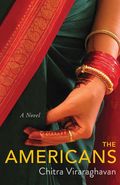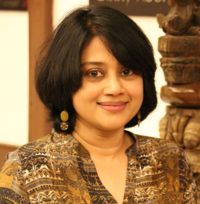Chitra Viraraghavan's novel The Americans is an eloquent and heart-warming debut from an exciting new voice that brings up questions of race, ethnicity and point of origin, and explores the puzzles of identity, place and human connection, which makes it perfect for fans of Jhumpa Lahiri’s Interpreter of Maladies and Dinaw Mengestu’s The Beautiful Things That Heaven Bears. Learn more about the novel and Chitra in the interview below!
1. The Americans is partly about the experience of Indian immigrants in the United States. Would you say this is neither an Indian novel, nor an Indian-American novel but rather a novel about Americans, with all of its competing and sometimes conflicting identities?
It is Indian in the narrow sense of having been written by an Indian from India. It is not Indian-American. That makes it, I guess, a novel about America, and about certain types of Americans who are constantly having to negotiate their identities in America.
2. To what extent did you draw on your family’s experiences, or your own, in writing this novel?
Bits and pieces of my experiences and of people I know—but it’s a fragmented sort of reality. For one thing, there’s a fair bit of drama in the book which didn’t happen anywhere but in my imagination. Also, more than just stealing from the lives of specific people, I was looking at types of people—the "successful" immigrant, the one who doesn’t make it, the one who pretends to have made it to people back home in India, the one who falls off the map, the visiting parent, the second-generation immigrant and his/her issues, and so on. Some of the experiences, concerns and conflicts are common. I was interested in exploring the Indian-American community as a whole, insofar as that is possible. But I also have both major and minor characters of other ethnicities in the book so as to provide an overall sense of life in America.
3. Do you find that having lived in Boston while you were doing a PhD at Tufts gave you insight into the immigrant experience?
Certainly, although the student world tends to be somewhat insular. I had close friends and housemates who were not Indian and this gave me different insights into America. Of course, among the things we were reading in class was literature representing different types of immigrant experience. For me, my sense of the immigrant experience was sharpened when I came back after a gap of several years and travelled around the US and met different sorts of people, both from the Indian community and outside it. I took advantage of the perspective of being something of an "inside outsider."
4. What was the reaction of the Indian community when this novel was first released there? And what reaction do you anticipate from the American community?
People like my book, it’s been pretty well received. It’s had a fair bit of press, received several good reviews. There’s been a lot of interest because practically everyone one knows has family in America. When our friends, siblings, cousins and aunts come home, they are "American" to us! As for how the book will be received in the US, I’m hoping well, and with openness. I’ve tried to present different points of view in as true a way as possible, and from my own observations of life in the US.
5. Many of your characters are struggling with their cultural identity, some pushing away their Indian heritage as perhaps a means of self-protection. Is it fair to say that in many respects this novel is an exploration of the boundaries between our real identities and the ones we create for ourselves?
Strangely, even our "real" identities are socially imposed, right? I was never really "Indian" till I came to America or even considered what my ethnicity/race was. Coming to America was an eye-opener in many ways, causing me to even rethink my position at home, and the privileges that attend middle-class existence in India. The effects of race on everyday life and one’s sense of self and identity were things that could not be bypassed in America. So every character comes to terms with this in her or his way. Some reject their original culture while others embrace it much more than they would have done had they been in India.
6. Tara and her sister Kamala are very different from one another. Kamala is deeply embedded in what she thinks it means to be living an American life, while Tara is holding tightly to her roots. Do these two characters represent extremes in the experiences of immigrants?
Kamala is certainly more "American" in a mainstream way but then she’s really the one who’s the immigrant. Tara is an Indian from India, and goes back at the end of the novel. On the other end of the spectrum to Kamala in terms of the immigrant experience would be Shantanu, who is an illegal alien, or even Madhulika, whose immigrant anxiety makes her cling to her Indianness.
7. Aside from its central themes, was there a specific incident that prompted you to begin writing this novel, or that suggested its shape to you?
I came back to the States for a visit in 2005, after a gap of several years. I was no longer an indigent student. I was able to travel around unlike before. In the early 2000s, I’d been asked to present a paper on Indian-American literature at home. Researching it, I was struck by how self-representations of Indian-Americans had changed from decade to decade, from the 1960s to the 1990s, starting from a position of almost total cultural isolation to something like its exact opposite, enabled by the IT revolution. This seemed to shape notions of identity and belonging in particular ways, and I wanted to examine how well Indian culture, heterogeneous though it is, transplanted, so to speak, in foreign soil. I wanted to explore it through people of different ages, genders, backgrounds, culture, legal status in America, and so on. Which is why I ended up with eleven characters!
8. What does your title refer to? What does it mean to be “American”?
This is what every character tries to figure out. Once you make a choice to be somewhere, however much that choice is determined by circumstance, you are forced to see yourself in terms of mainstream culture—how close or far removed you are from it. My title is meant to be ironic in that many of my characters are in different ways at quite a remove from what would be considered "American." That is to say, mainstream American. Their identity as American is not a given for various reasons including legal status, race/ethnicity, etc, and so there are constant negotiations. In some cases, this even leads to ghettoization of a kind. I have tried to explore Americanness in different ways—not just through individual situations, but through references to various pieces of American literature (which appear as entries in one character’s reading journal), through ideas of citizenship and, for instance, conscientious objection, through the lives and situations of marginalized people belonging to other races/ethnicities/cultures. And, of course, there are two Indians from India who provide the counterpoint in a sense.
9. What do you believe are the predominant Western views of India? Do you think your novel will help expand or change those views?
There remains a tendency to see India in terms of certain cultural or even visual clichés, certain stereotypes. Veiled women, Bollywood, heat and dust, natural disasters, and so on. I’m not sure that my book will change that because it takes place almost entirely in America and so sets up a somewhat different dynamic—that between writer and her (foreign) subject. But I think my approach has been that of not playing into stereotypes even while using many culture-specific details, of not exoticizing my subject, of trying to keep my characters real, and believable anywhere.
10. Many of the characters in the novel try to remake themselves to assimilate. Do you think that concept is especially true for Americans and for immigrants to the United States?
I think, starting from the 19th century, there have always been people who have tried to "pass," as the term goes. There’s a lot of pressure to belong, I guess. But the truth is, however much you try to assimilate, it’s a culture that tends to exclude, that embraces only certain types of ethnicities. Which is why real assimilation is tough. So there only end up being different types of accommodations.
***
Thanks, Chitra! Make sure to pick up a copy of The Americans today.
-Amanda


